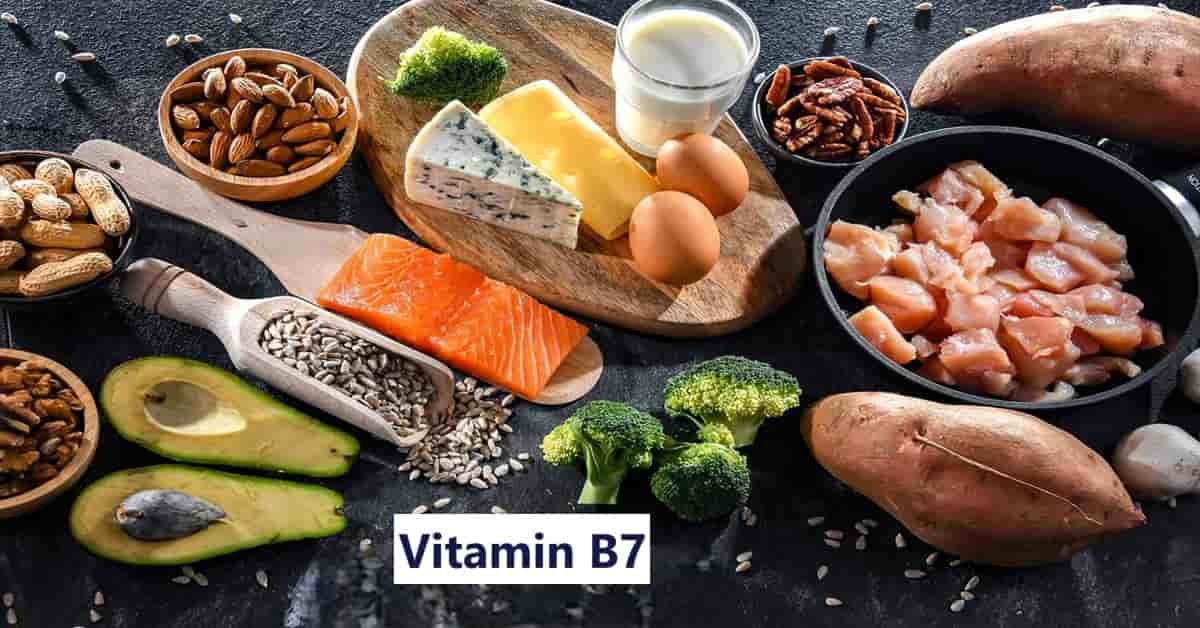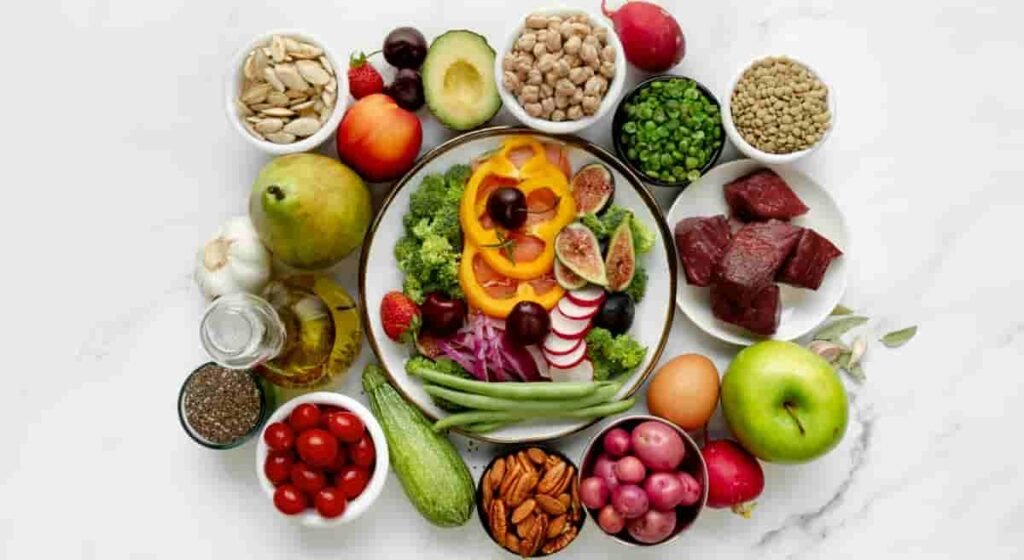Vitamin B7, commonly known as biotin, is a water-soluble vitamin that plays a critical role in numerous bodily functions. Biotin is essential for the metabolism of fats, carbohydrates, and proteins, making it vital for energy production. Here’s a closer look at the myriad benefits of vitamin B7:
1. Energy Metabolism
- Macronutrient Breakdown: Biotin is instrumental in converting food into energy. It acts as a coenzyme involved in the metabolism of carbohydrates, fats, and proteins. Specifically, biotin helps with the enzymatic processes that convert pyruvate into acetyl-CoA, a key molecule in energy production.
2. Healthy Skin, Hair, and Nails
- Beauty Benefits: Biotin is often touted for its role in maintaining healthy skin, hair, and nails. It is crucial for the synthesis of keratin, a protein that forms the structural foundation of hair and nails. Adequate biotin levels can lead to stronger hair and nails, as well as improved skin health.
3. Supports Healthy Pregnancy
- Fetal Development: Biotin plays a significant role during pregnancy. It is necessary for embryonic growth and is particularly important in the synthesis of fatty acids and amino acids. Sufficient biotin levels can support the healthy development of the fetus and help prevent birth defects.
4. Regulation of Blood Sugar Levels
- Blood Glucose Control: Some studies suggest that biotin may help regulate blood sugar levels, making it potentially beneficial for individuals with diabetes. Biotin is thought to assist in improving insulin sensitivity, helping to maintain stable blood glucose levels.
5. Healthy Nervous System
- Cognitive Function: Biotin contributes to normal neurological function by supporting the synthesis of neurotransmitters. This is essential for brain health, cognitive function, mental clarity, and overall mood regulation.
6. Cholesterol Management
- Heart Health: Biotin can play a role in lipid metabolism and may help maintain normal cholesterol levels. Some studies suggest that biotin may reduce the levels of LDL (bad) cholesterol while potentially increasing HDL (good) cholesterol, which contributes to cardiovascular health.
7. Promotes Cell Growth
- Cellular Function: Biotin is involved in the synthesis of DNA and RNA, which are crucial for cell growth and replication. This function is particularly important for maintaining healthy tissues and promoting repair processes within the body.
8. Supports Immune Function
- Immune System Health: Adequate biotin levels can support immune system functions by promoting overall cellular health. This, in turn, helps the body respond effectively to infections and reduces the risk of chronic diseases.
List of Foods That Contain Vitamin B7
Biotin can be found in a variety of foods, making it relatively easy to obtain through a balanced diet. Here is a list of biotin-rich foods:
1. Animal Products
- Eggs: Particularly the yolk, which is one of the best sources of biotin.
- Liver: Beef and chicken liver are extremely rich in biotin.
- Fish: Salmon and tuna provide moderate amounts of biotin.
- Meat: Red meat and poultry, such as chicken and turkey.
2. Dairy Products
- Milk: A good source of biotin.
- Cheese: Such as cheddar and Swiss cheese.
- Yogurt: Contains beneficial probiotics along with biotin.
3. Nuts and Seeds
- Almonds: One of the best plant sources of biotin.
- Walnuts: Provide a good amount of biotin and healthy fats.
- Sunflower Seeds: Also rich in biotin and vitamin E.
4. Legumes
- Lentils: A healthy source of plant-based biotin.
- Peanuts: Contain a moderate amount of biotin.
5. Whole Grains
- Oats: A whole grain rich in biotin and fiber.
- Barley: Another whole grain that offers biotin benefits.
6. Vegetables
- Cauliflower: A good vegetable source of biotin.
- Mushrooms: Such as shiitake and button mushrooms.
- Spinach: Provides vitamins and minerals, including biotin.
7. Fruits
- Bananas: Contain biotin along with potassium and fiber.
- Avocados: A nutrient-dense fruit rich in healthy fats and biotin.
FAQs About Vitamin B7
1. What is the recommended daily intake of vitamin B7?
- The adequate intake (AI) for biotin varies with age, but for adults, it is generally recommended to consume 30 micrograms per day. Pregnant and breastfeeding women may require higher amounts, around 30 to 35 micrograms per day.
2. What are the symptoms of vitamin B7 deficiency?
- Symptoms of biotin deficiency include hair loss, skin rash (particularly around the eyes, nose, and mouth), brittle nails, fatigue, and neurological symptoms such as depression or confusion. Severe deficiency is uncommon but can occur, particularly in individuals with specific health issues or malabsorption disorders.
3. Can I get enough vitamin B7 from my diet?
- Yes, most people can meet their biotin needs through a varied and wholesome diet that includes the foods listed above. Biotin is also produced by gut bacteria, contributing to overall intake.
4. Is biotin supplementation necessary?
- Biotin supplementation is not typically necessary for most healthy individuals who consume a balanced diet. However, individuals experiencing hair loss, brittle nails, or those with certain health conditions may consider supplements after consulting with a healthcare professional.
5. Are there any side effects from taking biotin supplements?
- Biotin is considered safe to take, even at high doses, as excess amounts are typically excreted in urine. However, some individuals may experience mild side effects such as gastrointestinal discomfort or skin rashes. Always consult a healthcare provider before starting supplements.
6. How does vitamin B7 impact hair and nail health?
- Biotin is crucial for the production of keratin, a key protein in hair and nails. Adequate biotin levels can promote stronger, healthier hair and reduce brittleness in nails, making it a popular ingredient in beauty and hair care products.
7. Can biotin help with blood sugar regulation?
- Some research suggests that biotin may improve insulin sensitivity and help regulate blood sugar levels, which could be beneficial for individuals with diabetes. However, more research is needed to establish definitive effects.
8. What are the best dietary sources of vitamin B7?
- The best sources of biotin include egg yolks, organ meats (like liver), nuts (especially almonds), seeds (like sunflower seeds), and various vegetables (such as cauliflower and mushrooms). Consuming a diverse diet that includes these foods can help ensure adequate biotin intake.


